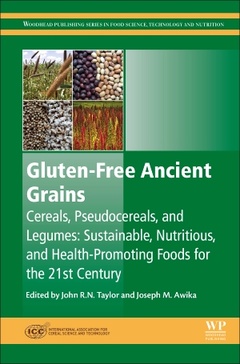Gluten-Free Ancient Grains Cereals, Pseudocereals, and Legumes: Sustainable, Nutritious, and Health-Promoting Foods for the 21st Century Woodhead Publishing Series in Food Science, Technology and Nutrition Series
Coordonnateurs : Taylor John R.N., Awika Joseph

Gluten-Free Ancient Grains: Cereals, Pseudocereals and Legumes covers grains that are not related to wheat. This includes sorghum, the major millets - pearl, foxtail, proso and finger millet, as well as teff, the major pseudocereals - quinoa, amaranth and buckwheat, and emerging legume grains - lupin, cowpea, Bambara groundnut and marama beans. These are all characterized as gluten-free grains.
The book provides key information on the sustainable production of these grains. Ancient grains are characterized by their ability to produce a crop under harsh environmental conditions where the major cereals are not-sustainable or even fail. In order to meet growing food demand, and with water resources becoming scarce, this is a highly valuable quality. Chapters review the major grains, analyzing their production and manufacture processes and detailing their impact on long-term good health.
Of interest to many people and organizations in the food production chain, this book will be of significant value to agricultural scientists, food company innovation and R&D managers, academic and food company nutritionists and dietitians and governmental and non-governmental health ministries and research institutes.
2. Global Supply of Ancient Grains in the 21st Century: Keys to Unlocking their Full Potential
3. Sorghum: Its Unique Nutritional and Health-Promoting Attributes
4. Millets: Their Unique Nutritional and Health-promoting Attributes
5. Quinoa: Its Unique Nutritional and Health-promoting Attributes
6. Amaranth: Its Unique Nutritional and Health-promoting Attributes
7. Buckwheat: Its Unique Nutritional and Health-promoting Attributes
8. Lupins: Their Unique Nutritional and Health-promoting Attributes
9. African Legumes: Nutritional and Health-promoting Attributes
10. Wild Rice: Nutritional and Health Promoting Attributes
11. Future Research in the Ancient Grains
John is author of numerous scientific papers and book chapters on sorghum, millets and other grains. He was editor-in-chief of the Journal of Cereal Science from 2018-2021. He has co-edited a monograph on Ancient Grains and the second edition of Sorghum and Millets: Chemistry, Technology and Nutritional Attributes. He is presently co-editing a handbook on modern cereal science and technology.
He is an Honorary President of the International Association for Cereal Science and Technology (ICC), and fellow of ICC, the Cereal and Grains Association and the International Academy of Food Science and Technology, and 2021 was recipient of the T.B. Osborne Medal from the Cereals and Grains Association.
Joseph Awika is Associate Professor at Texas A&M University. His research focus is grain chemistry and biochemistry - identifying mechanisms by which secondary plant metabolites and minor grain constituents can be optimized to improve food quality and human health. Dr. Awika’s current research investigates synergistic interactions of specific grain polyphenols in food matrix, and effect of complexation of the polyphenols with starch and proteins on macronutrient digestibility and functionality. He is heavily involved in international research activities aimed at improving nutritional, health and food-processing quality of cereals and legumes with the goal of reducing poverty and preventing disease in Africa.
- Provides a comprehensive overview of non-wheat grains
- Reviews the manufacture and sustainable production of these grains, detailing their abilities to grow in harsh conditions
- Analyzes the nutritional value of ancient grains and their health-promoting qualities
Date de parution : 07-2017
Ouvrage de 356 p.
15x22.8 cm
Thèmes de Gluten-Free Ancient Grains :
Mots-clés :
African legumes; agricultural research; amaranth; ancient grains; antinutrients; antioxidant; bioactive compounds; buckwheat; cancer; cardiovascular disease; cereals; climate change; composition; diabetes; diet-related noncommunicable diseases; dietary fiber; fiber; fonio; food processing; food processing properties; food standards; food value chain; genomics; global food potential; gluten free; gluten-free; gluten-free products; glycemic index; grain supply; health; health benefits; health-promoting components; inflammation; lupin; millets; nutrition; nutrition transition; nutritional properties; nutritional quality; nutritional value; obesity; phenolic phytochemicals; phytochemicals; polyphenol; production data; protein; pseudocereals; pulses; quinoa; sorghum; technological properties; wild rice; Zizania spp



